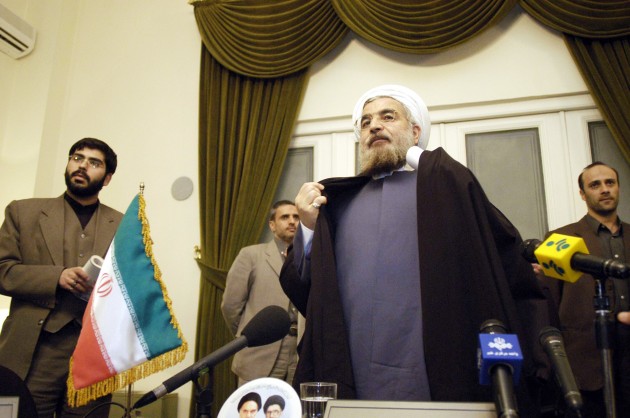Does Iran’s New President Open A Path To Nuclear Compromise?
Posted on

New Iranian president Hassan Rowhani.
Will Iran’s new president defuse the confrontation with the United States over the Islamic Republic’s nuclear program? Hassan Rowhani, elected with a narrow 50.7 percent of the votes in Friday’s presidential election, inherits a dangerous stalemate. Iran is stonewalling on answering UN inspectors’ questions about possible military dimensions of its nuclear program, while talks with the United States and five other world powers have broken down.
But Rowhani has the credentials to bring a new spirit to the talks. As Iran’s nuclear negotiator from 2003 to 2005, Rowhani met Western demands to suspend uranium enrichment: Iran claims its program is a strictly civilian effort to produce nuclear power and medical isotopes, but the West fears Iran could enrich uranium to the level needed to make an atomic bomb. When Mahmoud Ahmadinejad became president in August 2005, Iran switched to a hard line approach. Rowhani’s goal had been to keep Iran from being referred to the UN Security Council; Ahmadinejad did not care. He defied the West and resumed enrichment work, – and the first UN sanctions were levied against Iran in 2006.
Now Rowhani is calling for a more conciliatory approach to get the United States and its allies to lift the increasingly tough sanctions which have crippled the Iranian economy. In a press conference Monday, his first since winning the presidential ballot, he offered more openness on Iran’s nuclear program and said that Iran wants to reduce tensions with Washington, which has not had diplomatic relations with the Islamic government that seized power in 1979.
This is change of a sort, but real change may take time, perhaps years into Rowhani’s four-year term, which will begin when he takes office on August 3. Rowhani managed to suspend uranium enrichment despite the skepticism of the most powerful person in the country, the Supreme Leader Ayatollah Ali Khameini, whose power outranks that of the elected presidency. Iranian diplomats told me that Khamenei said to Rowhani at the time, Go ahead, suspend enrichment, negotiate with the West, but I assure you that nothing will come of it, and they will only try to trick you by extracting concessions without giving anything in return. Curiously enough, that was the same warning the United States was giving Britain, Germany, and France – the so-called EU-3 who negotiated with Rowhani from 2003-2005 – about their chances of getting a deal from Iran.
Defending his compromise approach, Rowhani said in a speech in Iran in 2004 that the suspension cost the Islamic Republic nothing, keeping the United States at bay while Iran worked on other parts of its nuclear program, namely making the feedstock gas used for enrichment. “By creating a calm environment, we were able to complete the work [at the uranium gas conversion plant] in Esfahan,” Rowhani said.
Tactics have changed since 2004, especially since some leaders in Iran believe suspending enrichment was a mistake because it was not matched by concessions from the West. Rowhani made clear at his press conference Monday that his government would not suspend enrichment again, mainly because Iran now has thousands of centrifuges enriching uranium, while there were only a few test machines running in 2003. “We have passed that period. We are now in a different situation,” Rowhani told reporters. “All should know that the next government will not budge from defending our inalienable rights.”
Rowhani did mention a way forward, a plan he had worked out in 2005 with then French President Jacques Chirac. This plan was shot down by the EU-3, however, since it would have allowed Iran to continue enriching. US and EU policy at that time was for there to be “not one centrifuge turning” in Iran. Rowhani said what he liked in the Chirac plan was that Iran’s right to enrich would be recognized in line with the nuclear Non-Proliferation Treaty (NPT) and that Iran would allow the UN wider inspection rights to guarantee that the Iranian nuclear program is peaceful.
This is not far from Iran’s position in the most recent talks, which foundered in April since the two sides have sharply opposing demands. Iran wants the first step to be full relief from sanctions; the United States wants the first step to be for Iran to cease enriching uranium to 20 percent, which is closer to weapon-grade than the five percent needed for power reactors. Behind the scenes, however, it is clear that the Obama administration is hungry for a deal. The United States is also apparently ready to let Iran keep some low-grade enrichment in a final agreement, although Iran must be flexible on the timing of sanctions relief. In such a situation, where the chasm between official positions is exacerbated by harsh rhetoric – such as Ahmadinejad’s denying the Holocaust and threatening Israel – the change of tone Rowhani brings could break the ice. But this remains a big if.
Meanwhile, the United States could turn up the pressure on Iran by arming Syrian rebels well enough to hold off the resurgent security forces of Iran’s Alawi ally, Syrian President Bashar Assad. This is another big if. It is still not clear how far the Obama administration, which announced last week it is now ready to give military aid, is prepared to go. But if the war in Syria does convince the Iranians they have much to fear from US military action, it would greatly strengthen the US dual-track strategy with Iran of negotiations plus pressure. That, in turn, might make it easier for Rowhani to convince the Supreme Leader that, faced with crippling sanctions and a real military threat, the time has come for Iran to strike a deal on the nuclear issue. But this is a huge if.
Michael Adler studies the Iranian nuclear program and non-proliferation at the Wilson Center in Washington.
Subscribe to our newsletter
Promotions, new products and sales. Directly to your inbox.
